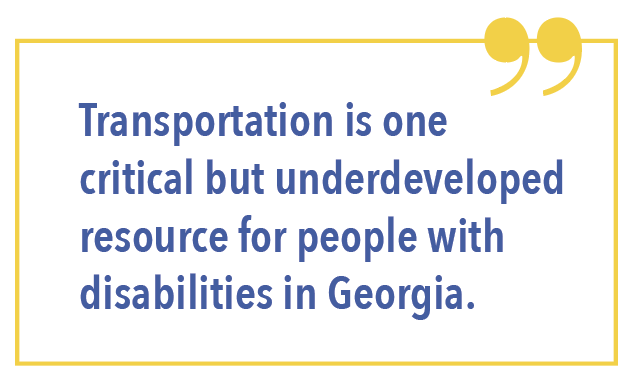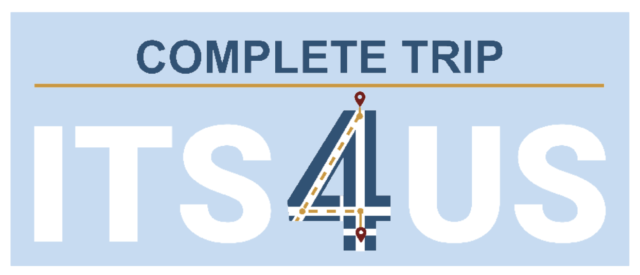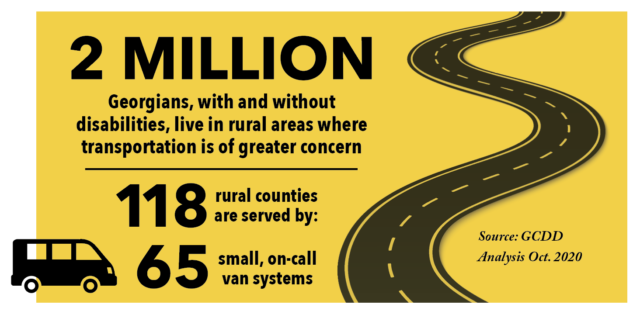In October 2020, the Georgia Council on Developmental Disabilities (GCDD) collected public input data from over 300 respondents across the state.
For those respondents, the number one barrier to improving the lives of people with developmental disabilities and their families was a lack of resources or not knowing what resources are available.
GCDD Analysis
 Transportation is one critical but underdeveloped resource for people with disabilities in Georgia. It can be the avenue to a doctor’s appointment, to grocery shopping, or even employment. All of these everyday tasks can become vastly harder when an individual’s transportation needs aren’t met. Many communities do not have access to needed solutions, nor do people know what solutions are currently available or being developed in their community.
Transportation is one critical but underdeveloped resource for people with disabilities in Georgia. It can be the avenue to a doctor’s appointment, to grocery shopping, or even employment. All of these everyday tasks can become vastly harder when an individual’s transportation needs aren’t met. Many communities do not have access to needed solutions, nor do people know what solutions are currently available or being developed in their community.
In July 2020, as part of the comprehensive review and analysis for the council’s Five-Year Strategic Plan, GCDD noted that MARTA Mobility is Georgia’s ADA-designated complementary paratransit service, providing accessible transportation to people with disabilities.
The ADA, or the Americans with Disabilities Act signed into law by President George H. W. Bush, “prohibits discrimination against individuals with disabilities in all areas of public life, including jobs, schools, transportation and all public and private places that are open to the general public.”
Challenges with MARTA Mobility include a 24-hour advance appointment notice, no trip drop-off time and the service only being available in the metro Atlanta areas that have bought into the MARTA system.

The GCDD analysis also found that approximately two million Georgians, both with and without disabilities, live in rural areas where transportation is of greater concern, and Georgians in 118 rural counties are served by 65 small, on-call van systems.
Coordinated Transportation System — Department of Human Services
![]()
The Georgia Department of Human Services (DHS) is one resource for individuals with unmet transportation needs. DHS has its own program called the Coordinated Transportation System (CTS). The program includes a number of offices staffed in each DHS region, where they manage a fleet of government vehicles and the web-based request system, called TRIP$.
The program fits into DHS’s broader role as a state agency, providing services to promote self-sufficiency, safety and well-being for all Georgians. CTS is the designated program in Georgia to receive Section 5310 funding. Section 5310 is a federal program designed to fund transportation projects to enhance mobility for seniors and those with disabilities, under the Fixing America’s Surface Transportation (FAST) Act.
CTS provides a vital service to rural areas without public transit, but additional transportation programs are currently being developed in Georgia to further meet the need, including two from the Atlanta Regional Commission (ARC).
Safe Trips in a Connected Network (ST-CTN) System – Atlanta Regional Commission
This February, ARC announced that it was awarded with a grant through the US Department of Transportation’s (USDOT) “Complete Trip – ITS4US Deployment Program,” to begin phase one of a project developing a more accessible transportation system in Gwinnett County.

The proposed ARC project is called the Safe Trips in a Connected Transportation Network (ST-CTN) system, and the ultimate goal is to combine a number of technologies and solutions to create a more equitable way of traveling in the county. The total amount of the three-phased award is over $9 million.
Maria Roell, a senior planner with ARC’s transportation group, says ST-CTN will have a focus on underserved communities in Gwinnett, including people with disabilities, older adults and those with limited English proficiency. Roell says considering the user perspective is essential to the first two phases of the project.
 “It’s about making complete trips easier for people with mobility issues,” Roell said. “There’s a lot of populations that they’re trying to reach.”
“It’s about making complete trips easier for people with mobility issues,” Roell said. “There’s a lot of populations that they’re trying to reach.”
Transportation is an important policy issue for many people with disabilities in Georgia. Every individual has different travel needs, and services can be a challenge to navigate for those that don’t have their own means of transportation.
Micro Transit in Gwinnett and DeKalb Counties
ARC has another transportation project underway in metro Atlanta – a micro transit pilot in Gwinnett and DeKalb counties that is partnering with the Center for Pan Asian Community Services (CPACS) to allow users to request CPACS shuttles to a specific location. The project is currently halfway through the first phase of an 18-month timeline, and it could represent a wider embrace of both micro transit and transportation equity in the counties.
![]() Joseph Yawn, a transportation technology administrator with ARC, says part of the grant requirement for the CPACS project is an inclusive planning effort. “The stakeholder committee is all driven by riders, so they are really shaping what they want the technology to be.”
Joseph Yawn, a transportation technology administrator with ARC, says part of the grant requirement for the CPACS project is an inclusive planning effort. “The stakeholder committee is all driven by riders, so they are really shaping what they want the technology to be.”
Over the next two years in Gwinnett, the micro transit pilot will be completed, and ARC will continue to develop ST-CTN with a variety of partners. One of these will be the Statewide Independent Living Council of Georgia (SILCGA), which will lead the project’s stakeholder engagement.
Roell says the opportunity to increase equity is huge, and ST-CTN is in the early stages. “Phase three is really when we start talking about, where else do we want to put it?”

